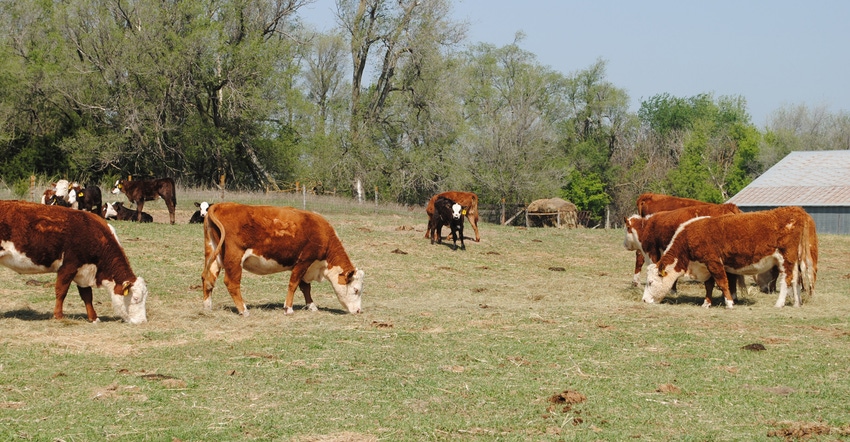April 21, 2021

Cultivating scholars and leaders for agriculture's future is a central tenet of so many of the University of Nebraska’s educational programs and efforts. Helping future leaders to understand production agriculture, the broader agribusiness sector and the numerous policy issues affecting agriculture also is a priority.
One program that directly addresses this need is the Nebraska Beef Industry Scholars program, an interdisciplinary effort of faculty in multiple departments in the College of Agricultural Sciences and Natural Resources, as well as the School of Veterinary Medicine and Biomedical Sciences. The NBIS program’s 12th class of scholars finished their classes this spring, each of them earning a minor focusing on beef industry issues to go along with their existing major in CASNR.
For students in the program, the final semester of their senior year focused on policy issues in the beef industry. The group was not able to travel to industry conventions and engage in policy discussion and development as in previous years because of COVID-19 cancellations and restrictions.
However, the group still analyzed a range of policy issues and interacted with leaders and experts in agriculture to develop a strong understanding of the scope of several policy issues affecting the beef industry today — and the challenges in moving forward with policy choices.
COVID-19
With the way that the COVID-19 pandemic has affected nearly everything and everybody across the country over the past year, there are major questions and issues about the federal response and relief provided for the economic losses and hardship. Cattle and other crop and livestock producers had to deal with market disruptions that caused significant price losses, at least in the short term.
Early COVID-19 relief from last spring helped offset some of the market losses, and subsequent relief packages have added payments. Later relief packages also expanded the support for other losses related to COVID-19 across the food system and included new assistance for socially disadvantaged producers.
While the relief has provided substantial cash flow and financial support for agriculture over the past year, other issues related to COVID-19 also are important to address. COVID-19 is a human health crisis, but it is a reminder that agriculture needs to always be vigilant against any animal health crisis as well, such as the African swine fever virus still plaguing China.
In the short run, ASF has actually created an increased demand for animal protein exports to China, but one can recognize that there are important policy questions and challenges to prepare for and protect against any foreign animal diseases entering the U.S. food animal production sector.
Climate
The attention to climate has ramped up substantially with the new administration, and there are expectations for the most aggressive effort on climate and greenhouse emissions legislation in more than a decade.
The previous legislative push died over the debate on cap and trade and the projected economic burden of proposed regulations. A decade later, the debate seems to be not so much whether climate policy will happen, but rather what it will look like.
As such, the approach for many ag groups has also shifted from positions against the policy in general to active participation in trying to shape the policy for ag to play a positive role. While the debate in Washington, D.C., may determine whether agriculture faces burdens or opportunities or both with climate policy, key issues and questions will remain — including the public expectations of agriculture, either through public policy or through consumer and food supply chain-driven demands.
Defining and measuring sustainability, balancing voluntary incentives versus regulatory requirements, and addressing public versus private management of the nation’s resources are all challenges to be addressed in the months and years ahead.
Traceability
Beef industry traceability has been a long-running topic, at least since the “cow that stole Christmas” BSE incident in 2003 — and frankly, long before that with national animal ID and country-of-origin labeling debates that stretch back to the 1980s.
Recent developments with national policy or regulatory approaches to electronic RFID tags as the national platform for animal identification have renewed the debate, just as branding law deliberations in Nebraska have done so locally.
The broader issue of traceability, however, is not specifically which technology or which practice is used, but what level of traceability will be expected as a standard going forward, whether because of public policy direction or consumer and supply chain pressure.
While much of agriculture still maintains the broad anonymity of producing a commodity and passing that commodity on to the next buyer, increasing calls for traceability from regulators as well as increasing opportunities to access and serve consumers and key markets with a traceable, identity-preserved product are pushing the agricultural industry toward broader traceability.
That brings with it issues of technology, economics, producer data and liability, but the shift is happening. The question may be whether agriculture will help define the framework.
Taxes
Another topic on the radar is the ever-present issue of taxes. Producers in Nebraska have been observing and engaging in the property tax debate for many years with attention to growing the amount of property tax relief through credits or restructuring of public finances.
Nationally, the debate has emerged over the new administration’s perceived tax plans, specifically the issues of estate and capital gains taxes. While awaiting a formal legislative debate, concerns have been raised about a potential rollback of estate tax relief passed in 2017, as well as a proposal to tax unrealized capital gains when property is transferred.
The details are still to be worked out, and some of the policy promises have suggested the changes would only affect upper-end taxpayers, but estate and capital gains taxes definitely have an effect on the viability of passing on farms and ranches to the next generation.
Even if the question is not about an individual taxpayer’s ability to pay, there will be questions about the effect on multigenerational operations in agriculture and in the general economy. There are numerous other policy issues in the headlines and on the horizon for the beef industry as well, but the four broad issues selected and examined by this year's NBIS students provide a good perspective on some key issues.
They also share a common theme of the need for greater understanding and recognition of the broad effects of specific policy choices. The work points to the continual need for the beef industry — and other sectors — to address important issues and continue moving forward.
The work also points to the quality of students and the comprehensive education and skills they have garnered to become future leaders in the beef industry.
Lubben is the Extension policy specialist at the University of Nebraska-Lincoln.
Read more about:
Covid 19About the Author(s)
You May Also Like






